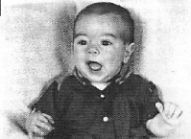 John Marty Stuart was born on September 30, 1958 in Philadelphia, Mississippi to proud parents John and Hilda. Marty loved music at an early age. His momma says as an infant, Marty would hold on to "this little music box and wouldn't let go. We would keep winding and winding it for him. We have pictures of him lying in his crib holding that music box and listening to 'Twinkle, Twinkle, Little Star' over and over. He just loved it." John Marty Stuart was born on September 30, 1958 in Philadelphia, Mississippi to proud parents John and Hilda. Marty loved music at an early age. His momma says as an infant, Marty would hold on to "this little music box and wouldn't let go. We would keep winding and winding it for him. We have pictures of him lying in his crib holding that music box and listening to 'Twinkle, Twinkle, Little Star' over and over. He just loved it."
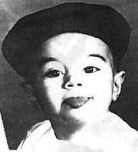 Marty got his first guitar at age 3. It was only the crank-up kind but it didn't take long for Marty to focus on music. By age 5, he wanted a REAL guitar. Marty began teaching himself to play the guitar and began playing the mandolin a few years later. His mom, who worked in a bank, loaned Marty the money to buy his first mandolin. Marty got his first guitar at age 3. It was only the crank-up kind but it didn't take long for Marty to focus on music. By age 5, he wanted a REAL guitar. Marty began teaching himself to play the guitar and began playing the mandolin a few years later. His mom, who worked in a bank, loaned Marty the money to buy his first mandolin.
 School didn't interest Marty--music did. In the sixth grade, Marty wrote an essay about what he was going to do, right down to the songs he was going the sing, the kind of music he would make, the awards he was going to win, and where he was going to live. It appeared to be destiny that Marty would grow up to be the Hillbilly Rocker. School didn't interest Marty--music did. In the sixth grade, Marty wrote an essay about what he was going to do, right down to the songs he was going the sing, the kind of music he would make, the awards he was going to win, and where he was going to live. It appeared to be destiny that Marty would grow up to be the Hillbilly Rocker.
While kids Marty's age were more interested in after-school play, Marty was enjoying the sounds of Flatt & Scruggs and Johnny Cash on the stereo and remembers giving away his copy of Meet The Beatles. Marty's mom and dad loved music too and took Marty to see Bill Monroe perform. The music Marty absorbed went into his soul--and Mr. Monroe's mandolin pick found a place in Marty's hand. It became a prized possession--carrying it to school in his pocket.
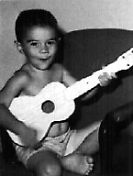 Marty first saw Lester Flatt and the Nashville Grass at Bill Monroe's Bean Blossom Festival in 1971. Marty says, "I stood by his bus to watch him come out. When Lester finally came out of the bus, the speech I'd planned for about seven years kind of got lost inside of me. I did manage to get an autograph." Marty was in awe of the master. Marty also met the man who would play a pivotal role in launching Marty's professional music career--Roland White--a member of Lester's band. Roland obviously saw talent as Marty played the mandolin for him. Marty first saw Lester Flatt and the Nashville Grass at Bill Monroe's Bean Blossom Festival in 1971. Marty says, "I stood by his bus to watch him come out. When Lester finally came out of the bus, the speech I'd planned for about seven years kind of got lost inside of me. I did manage to get an autograph." Marty was in awe of the master. Marty also met the man who would play a pivotal role in launching Marty's professional music career--Roland White--a member of Lester's band. Roland obviously saw talent as Marty played the mandolin for him.
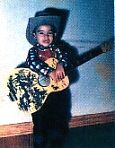 Marty's early performances were with the bluegrass band The Sullivans. They played festivals and Pentecostal churches in the South. Marty would travel and perform with them on weekends and during the summer. It was during one of these festivals that Marty ran into Roland again. This time Roland gave Marty his phone number and told him to call him if Marty could ever come out on the road with them for a weekend. Marty's early performances were with the bluegrass band The Sullivans. They played festivals and Pentecostal churches in the South. Marty would travel and perform with them on weekends and during the summer. It was during one of these festivals that Marty ran into Roland again. This time Roland gave Marty his phone number and told him to call him if Marty could ever come out on the road with them for a weekend.
Marty could think of nothing else. School didn't interest him. He daydreamed about bluegrass music and preferred reading country music magazines in class over history books. Upon being "caught" by the teacher and sent home from school, Marty decided to call Roland. The invitation was still open but Marty had to convince his mom and dad to let him go.
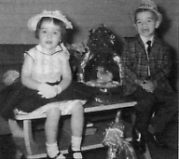 It wasn't easy for Hilda and John to send their son to Nashville on a bus--but they did and upon Marty's arrival in Nashville, he saw the Ryman Auditorium, then home of the Grand Ole Opry. That Labor Day weekend road trip in 1972 to Delaware ended with Lester offering Marty a full-time job with his band. Marty agonized over whether his parents would allow him to pursue his dream. "I knew they would do what was right," Marty says. "And I knew that Lester would shoot straight with them. He assured them I'd be seen after, that I'd keep a little money and send the rest to the bank. He'd have our manager, Lance Leroy, work out the details of how to finish my education. And he would assume responsibility for it all." It wasn't easy for Hilda and John to send their son to Nashville on a bus--but they did and upon Marty's arrival in Nashville, he saw the Ryman Auditorium, then home of the Grand Ole Opry. That Labor Day weekend road trip in 1972 to Delaware ended with Lester offering Marty a full-time job with his band. Marty agonized over whether his parents would allow him to pursue his dream. "I knew they would do what was right," Marty says. "And I knew that Lester would shoot straight with them. He assured them I'd be seen after, that I'd keep a little money and send the rest to the bank. He'd have our manager, Lance Leroy, work out the details of how to finish my education. And he would assume responsibility for it all."
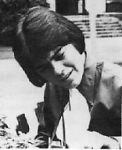 Marty performed with Lester until his death in 1979. At age 20, Marty had lost a hero, a mentor, a father-figure and a friend. The fire of music burned in Marty's blood and he had to move on. He went on the road with fiddler Vassar Clements, worked with Doc and Merle Watson, toured with Bob Dylan, played as a session musician on albums by Willie Nelson, Waylon Jennings, Emmylou Harris, Neil Young and Billy Joel. Marty performed with Lester until his death in 1979. At age 20, Marty had lost a hero, a mentor, a father-figure and a friend. The fire of music burned in Marty's blood and he had to move on. He went on the road with fiddler Vassar Clements, worked with Doc and Merle Watson, toured with Bob Dylan, played as a session musician on albums by Willie Nelson, Waylon Jennings, Emmylou Harris, Neil Young and Billy Joel.
Marty remembers laying in bed one day in 1980 wanting to meet his hero, Johnny Cash and meet him, he did! Once Johnny heard Marty play guitar, he invited Marty to join his band. Performing with another one of his heroes, Marty traveled all over the world and moved in the social circles he only dreamed about as a child.
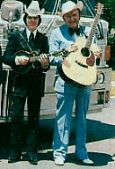 Marty met and fell in love with Johnny's daughter Cindy. They married in 1983 and divorced in 1988. Neither Marty nor Cindy speak publicly about their union, although Cindy did include two pages about Marty and their relationship in her book, The Cash Family Scrapbook. Marty met and fell in love with Johnny's daughter Cindy. They married in 1983 and divorced in 1988. Neither Marty nor Cindy speak publicly about their union, although Cindy did include two pages about Marty and their relationship in her book, The Cash Family Scrapbook.
After a six-year stint with Johnny and being a sideman his entire professional musical career, it was time to make a move to the front. Marty signed a recording contract with CBS Records and, in 1986, they released the album Marty Stuart. The first single off the album, "Arlene" broke the Billboard Top 20 and he was nominated for Best New Male Vocalist by the Academy of Country Music. It looked as if the road to success was going to be easy. But it was not. The album garnered little chart success and CBS scrapped releasing the follow-up album, Let There Be Country (it has since been released on Columbia Records). Marty left CBS Records and pondered what to do next.
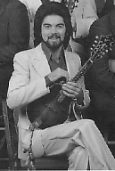 A broken and dejected man, he returned home to Mississippi. He sought out advice from his momma and prayed for a sign from God. Ironically, Jerry Sullivan called and asked Marty if he knew of a mandolin player that could join them--and Marty said, "ME!" After reaching the lowest point in his life, Marty Stuart was on a climb back up the ladder. Back to performing music and finding happiness through the Lord, Marty was ready to tackle Nashville once more. And the rest, shall we say, is history. A broken and dejected man, he returned home to Mississippi. He sought out advice from his momma and prayed for a sign from God. Ironically, Jerry Sullivan called and asked Marty if he knew of a mandolin player that could join them--and Marty said, "ME!" After reaching the lowest point in his life, Marty Stuart was on a climb back up the ladder. Back to performing music and finding happiness through the Lord, Marty was ready to tackle Nashville once more. And the rest, shall we say, is history.
Marty's current solo career from 1989 to 2000 was with MCA Records. With four gold albums and countless hit singles, Marty's career continues to go strong. Marty is one of the best instrumentalists in the business and his songwriting skills have matured and sharpened and he writes with new-found sensitivity in his music.
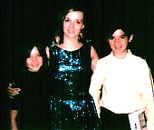 Not only is Marty's career going well, but he has, at last, found complete happiness and love with country music legend and Sweetheart of the Grand Ole Opry, Connie Smith. They met when Connie performed at the fair in Philadelphia, Mississippi on July 24, 1970. Marty recalls getting his mom to buy him a special yellow shirt so Connie would be sure to notice him and says he told his mom that evening that he was going to marry Connie Smith. Over the years, Marty and Connie became friends (both are members of the Grand Ole Opry), songwriting partners and fell in love. They were married on July 8, 1997. Not only is Marty's career going well, but he has, at last, found complete happiness and love with country music legend and Sweetheart of the Grand Ole Opry, Connie Smith. They met when Connie performed at the fair in Philadelphia, Mississippi on July 24, 1970. Marty recalls getting his mom to buy him a special yellow shirt so Connie would be sure to notice him and says he told his mom that evening that he was going to marry Connie Smith. Over the years, Marty and Connie became friends (both are members of the Grand Ole Opry), songwriting partners and fell in love. They were married on July 8, 1997.
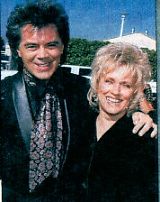 Marty's love for his fans is unending. There is always time to sign an autograph or listen to the accolades or give encouragement to an up-and-comer. In return, the fans adore Marty. He is an extraordinarily gifted human being--Connie calls him a genius--and she's right. Marty bridges the strong traditional/bluegrass/gospel past of country music with the new rockabilly, Southern Rock, contemporary sound. The history of country music lives within him. The doors of the Country Music Hall of Fame should one day open and welcome Marty Stuart. Marty's love for his fans is unending. There is always time to sign an autograph or listen to the accolades or give encouragement to an up-and-comer. In return, the fans adore Marty. He is an extraordinarily gifted human being--Connie calls him a genius--and she's right. Marty bridges the strong traditional/bluegrass/gospel past of country music with the new rockabilly, Southern Rock, contemporary sound. The history of country music lives within him. The doors of the Country Music Hall of Fame should one day open and welcome Marty Stuart.
(C) 1999 by Sherry Mattioli
|


 John Marty Stuart was born on September 30, 1958 in Philadelphia, Mississippi to proud parents John and Hilda. Marty loved music at an early age. His momma says as an infant, Marty would hold on to "this little music box and wouldn't let go. We would keep winding and winding it for him. We have pictures of him lying in his crib holding that music box and listening to 'Twinkle, Twinkle, Little Star' over and over. He just loved it."
John Marty Stuart was born on September 30, 1958 in Philadelphia, Mississippi to proud parents John and Hilda. Marty loved music at an early age. His momma says as an infant, Marty would hold on to "this little music box and wouldn't let go. We would keep winding and winding it for him. We have pictures of him lying in his crib holding that music box and listening to 'Twinkle, Twinkle, Little Star' over and over. He just loved it."